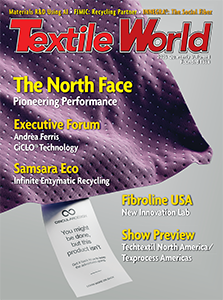vote of 18-3, has approved a free trade agreement (FTA) with Peru, paving the way for ratification
this year of the least controversial of four FTAs pending before Congress. The Peru FTA has the
general support of US textile manufacturers because it contains what they believe is a favorable
country-of-origin rule, and it provides opportunities for US yarn and fabric to be used in apparel
imports that will enjoy the duty-free treatment of the FTA. While importers of textiles and apparel
do not like strict country-of-origin rules, they are not likely to oppose the Peru pact.
On the House side, the Peru agreement has received the strong endorsement of Ways and Means
Committee Chairman Charles Rangel, D-N.Y., who visited Peru during the congressional summer recess
and received assurance from President Alan Garcia and other Peruvian government officials that they
would comply with congressional demands for fair labor practices and environmental protection.
Finance Committee Chairman Max Baucus, D-Mont., praised the action of his committee, saying:
“ American workers and businesses deserve to know they’re on a level playing field with our trading
partners, and the stronger labor and environmental provisions now in the Peru Free Trade Agreement
strike a better balance. This solid vote will allow Congress to complete a trade agreement with
Peru that is mutually beneficial to our countries.”
US Trade Representative Susan C. Schwab also praised the Senate committee action and said
the bipartisan support has put the Bush administration and Congress on a path for consideration of
all four of the pending FTAs.
While that may be the case where the Peru and Panama FTAs are concerned, FTAs with Colombia
and South Korea still face considerable opposition. Congress is concerned about some human rights
and labor problems in Colombia, and there is widespread concern about the South Korean pact among
US farmers, automakers and textile manufacturers. The chances of their being enacted this year are
very slim
Schwab has attempted to counter these concerns by referring to a just-released US
International Trade Commission (ITC) report that says US exports and gross domestic product will be
expanded as a result of the South Korean (KORUS) FTA. She says the ITC report “reinforces the fact
that the KORUS FTA is the most commercially significant free trade agreement the United States has
concluded in over 15 years.”
The ITC report is required by Congress in order to assess the likely impact of trade
agreements on the US economy as a whole and on specific industry sectors as well as the interests
of US consumers.
September 25, 2007




